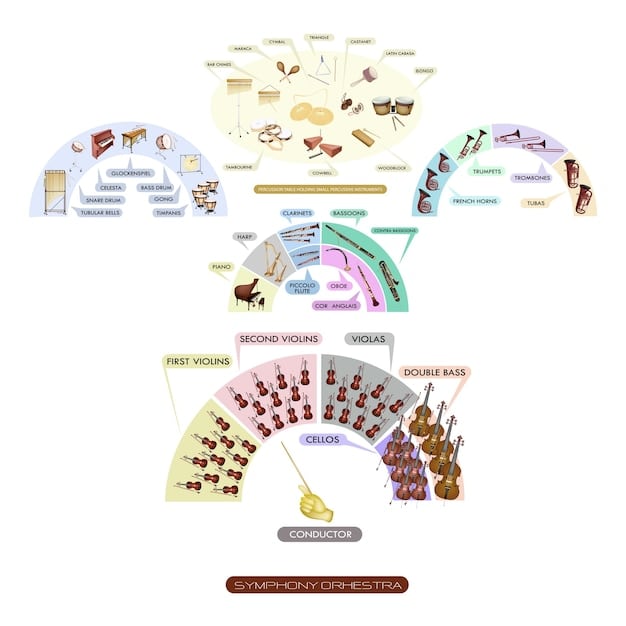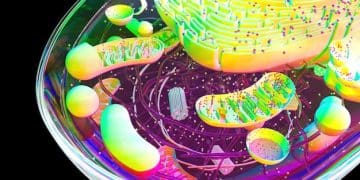Unlocking Longevity: The Science of Aging and the Quest to Extend Lifespan

The Science of Aging: New Research Reveals Potential Pathways to Extend Human Lifespan by 15% delves into the groundbreaking discoveries in aging research, highlighting various interventions and therapies that show promise in slowing down the aging process and potentially extending human lifespan.
The quest to understand and potentially extend human lifespan has captivated scientists and researchers for decades. Now, the science of aging: new research reveals potential pathways to extend human lifespan by 15%, offering a glimpse into the exciting possibilities that lie ahead.
Recent breakthroughs in various fields, from genetics to pharmacology, are converging to provide a more comprehensive understanding of the aging process. Discover how these advancements are paving the way for interventions that could significantly impact our health and longevity.
The Science of Aging: An Overview
The science of aging, also known as biogerontology, is a multidisciplinary field that seeks to understand the biological mechanisms underlying the aging process. Understanding these mechanisms is critical for developing interventions that can slow down aging and extend healthy lifespan.
The Hallmarks of Aging
The “hallmarks of aging” are nine distinct processes that contribute to cellular and organismal aging. These include:
- Genomic instability: Accumulation of DNA damage.
- Telomere attrition: Shortening of telomeres, protective caps on the ends of chromosomes.
- Epigenetic alterations: Changes in gene expression regulation.
- Loss of proteostasis: Impaired protein folding and degradation.

Theories of Aging
Several theories attempt to explain why aging occurs. One prominent theory is the “free radical theory,” which posits that the accumulation of oxidative damage from free radicals contributes to aging. Another is the “inflammation theory,” which suggests that chronic inflammation plays a key role in age-related diseases. Addressing these factors can influence the science of aging: new research reveals potential pathways to extend human lifespan by 15%.
In conclusion, understanding the complexities of the aging process is paramount. By delving into the hallmarks and theories of aging, we lay the groundwork for exploring potential interventions for extending healthy lifespans.
Emerging Research on Lifespan Extension
Recent years have witnessed significant advancements in aging research, revealing several promising avenues for lifespan extension. These include genetic manipulations, pharmaceutical interventions, and lifestyle modifications.
Genetic Manipulations
Studies in model organisms, such as yeast, worms, and mice, have demonstrated that modifying specific genes can significantly extend lifespan. For example, mutations in genes involved in insulin/IGF-1 signaling have been shown to increase longevity in these organisms. Research into the science of aging: new research reveals potential pathways to extend human lifespan by 15% through genetic manipulation is ongoing.
Pharmacological Interventions
Several drugs have shown promise in extending lifespan and improving healthspan (the period of life spent in good health). Some notable examples include:
- Rapamycin: An immunosuppressant that inhibits the mTOR pathway, a key regulator of cell growth and metabolism.
- Metformin: A commonly used diabetes drug that has been shown to have anti-aging effects in various animal models.
- Resveratrol: A natural compound found in grapes and red wine that activates sirtuins, a family of proteins involved in DNA repair and stress resistance.
Lifestyle Modifications
Lifestyle factors, such as diet and exercise, also play a crucial role in aging. Caloric restriction (reducing calorie intake without malnutrition) has been shown to extend lifespan in various organisms. Regular exercise has numerous health benefits, including reducing the risk of age-related diseases and improving overall quality of life. Adopting these modifications contributes to the science of aging: new research reveals potential pathways to extend human lifespan by 15%.
In summary, both genetic and pharmacological interventions, coupled with lifestyle modifications, show significant potential. These breakthroughs provide hope and direction for future studies.
The Role of Cellular Senescence
Cellular senescence is a state of irreversible cell cycle arrest that occurs in response to various stressors, such as DNA damage and oxidative stress. Senescent cells accumulate with age and contribute to tissue dysfunction and age-related diseases.
Senescent Cells and Aging
Senescent cells secrete a variety of pro-inflammatory molecules, growth factors, and proteases, collectively known as the senescence-associated secretory phenotype (SASP). The SASP can disrupt tissue homeostasis, promote inflammation, and contribute to the development of age-related diseases. Addressing cellular senescence is a key aspect of the science of aging: new research reveals potential pathways to extend human lifespan by 15%.
Targeting Senescent Cells
Strategies to eliminate or modulate senescent cells, known as senolytics and senomorphics, have shown promise in preclinical studies. Senolytics selectively kill senescent cells, while senomorphics modulate the SASP to reduce its harmful effects.
- Senolytics: Drugs like dasatinib and quercetin have shown senolytic activity.
- Senomorphics: Compounds that reduce the production of inflammatory factors by senescent cells.
- Clinical Trials: Several clinical trials are underway to evaluate the safety and efficacy of senolytics in humans.

By understanding the role of cellular senescence and developing effective strategies to target senescent cells, we can potentially mitigate many of the negative effects of aging and improve healthspan.
In conclusion, targeting senescent cells provides a promising route to enhance healthspan. Continued research and clinical trials are essential to understand their potential. The importance of the science of aging: new research reveals potential pathways to extend human lifespan by 15% efforts cannot be overstated.
The Impact of Nutrition on Longevity
Nutrition plays a pivotal role in influencing the aging process and overall longevity. Specific dietary patterns and nutrients have been linked to improved health outcomes and extended lifespans. Understanding these links is an integral part of the science of aging: new research reveals potential pathways to extend human lifespan by 15%.
Dietary Patterns
Certain dietary patterns have been associated with increased longevity. The Mediterranean diet, characterized by high consumption of fruits, vegetables, whole grains, and healthy fats, has been linked to a reduced risk of age-related diseases and increased lifespan. A diet emphasizing whole, unprocessed foods is generally more beneficial for long-term health.
Key Nutrients
Specific nutrients also play a crucial role in promoting longevity. Antioxidants, such as vitamins C and E, help protect against oxidative damage. Omega-3 fatty acids, found in fish and flaxseeds, have anti-inflammatory effects. Maintaining adequate levels of essential vitamins and minerals is vital for overall health and lifespan. The influence of key nutrients directly ties into the science of aging: new research reveals potential pathways to extend human lifespan by 15%.
- Antioxidants: Protect against oxidative damage.
- Omega-3 Fatty Acids: Offer anti-inflammatory benefits.
- Essential Vitamins and Minerals: Maintain overall health.
Maintaining proper nutrition is vital for managing the aging process. Paying close attention to dietary patterns and nutrient intake is crucial for optimizing health and extending lifespan. The impact is significant when considering the science of aging: new research reveals potential pathways to extend human lifespan by 15%.
Future Directions in Aging Research
The field of aging research is rapidly evolving, with numerous ongoing studies aimed at identifying new targets and interventions for extending lifespan and improving healthspan. Technological advancements, such as the use of artificial intelligence and big data analysis, are accelerating the pace of discovery.
AI and Aging Research
Artificial intelligence is being used to analyze large datasets and identify potential drug targets for anti-aging interventions. Machine learning algorithms can predict the effects of different interventions on lifespan and healthspan. AI is critical in helping unravel the science of aging: new research reveals potential pathways to extend human lifespan by 15% more efficiently.
Personalized Medicine
As we learn more about the genetic and environmental factors that influence aging, personalized medicine approaches are becoming increasingly important. Tailoring interventions to an individual’s specific needs and characteristics can maximize their effectiveness. Applying personalized medicine techniques amplifies the science of aging: new research reveals potential pathways to extend human lifespan by 15% benefits on an individual level.
- AI for Drug Discovery: Accelerating the identification of anti-aging drug targets.
- Personalized Interventions: Tailoring treatments to individual needs.
- Clinical Trials: Ongoing studies assessing the safety and effectiveness of anti-aging interventions.
The future of aging research holds great promise. With ongoing advancements in technology and personalized medicine, we can expect to see significant progress in extending lifespan and improving healthspan in the coming years.
In summary, the future of aging research will be largely driven by AI and personalized medicine. These advancements offer hope for extending human lifespan and improving overall health.
| Key Finding | Brief Description |
|---|---|
| 🧬Genetic Manipulation | Modifying genes in model organisms extends lifespan. |
| 💊Pharmacological Interventions | Drugs like rapamycin and metformin show anti-aging effects. |
| 🥗Optimal Nutrition | Dietary patterns like the Mediterranean diet promote longevity. |
| 🤖AI and Aging | AI is accelerating drug discovery and personalized treatments. |
Frequently Asked Questions
The hallmarks of aging include genomic instability, telomere attrition, epigenetic alterations, and loss of proteostasis. These processes contribute to cellular and organismal decline.
Caloric restriction, reducing calorie intake without malnutrition, has shown to extend lifespan in various organisms. It promotes cellular resilience and reduces the risk of age-related diseases.
Nutrition has a vital role, with dietary patterns like the Mediterranean diet, rich in antioxidants and omega-3 fatty acids, helping to increase longevity and reducing the risk of age-related diseases.
Senolytics are drugs that selectively kill senescent cells, which accumulate with age and contribute to tissue dysfunction. By removing these cells, senolytics can help improve healthspan.
AI is used to analyze extensive datasets to identify potential drug targets and predict the effectiveness of different interventions. This accelerates the discovery of anti-aging strategies.
Conclusion
The Science of Aging: New Research Reveals Potential Pathways to Extend Human Lifespan by 15% highlights groundbreaking discoveries and emerging strategies in the pursuit of longevity. From genetic manipulation and pharmacological interventions to lifestyle modifications and AI-driven research, the future holds significant promise for extending human healthspan.
Understanding the complexities of aging and applying evidence-based approaches will pave the way for healthier, longer lives. With continued research and innovation, we can look forward to a future where aging is no longer synonymous with decline.





